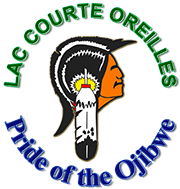

We, the Anishinabeg, the people of Odaawaa-Zaaga’iganiing, the Lac Courte Oreilles Band, will sustain our heritage, preserving our past, strengthening our present, and embracing our future. We will defend our inherent sovereign rights and safeguard Mother Earth. We will provide for the educational, health, social welfare, and economic stability of the present and future generations.
The Lac Courte Oreilles Indian Child Welfare and Family Services Department works to eliminate child abuse (abuse includes physical, sexual, and emotional), neglect and to prevent family breakup by fostering conditions favorable to the growth, spirit, culture, and individuality of each child. We focus on strenthening and preserving our Tribal families and children and promote the health, well-being, and safety of children and families through prevention, intervention, education, and advocacy and case management services.
Case management services includes voluntary services and can be through self-referral when individuals need assistance problem solving or referrals to other agencies who help support families and their children. Throughout the year, this department collaborates with other service agencies to offer alcohol and drug free events/activities to the community. In-house services include: Child Protective Services, Coordinated Services Teams, Kinship Care, Independent Living (for youth in out of home care), Parent Aide, Prevention programming, and Foster care licensing.
LCO Indian Child Welfare also intervenes in cases where the Indian Child Welfare Act applies to Child Welfare cases in all of the 50 United States. “ICWA” stands for the Indian Child Welfare Act, which is a federal law passed in 1978. ICWA was passed in response to the alarmingly high number of Indian children being removed from their homes by both public and private agencies. The intent of Congress under ICWA was to “protect the best interests of Indian children and to promote the stability and security of Indian tribes and families” (25 U.S.C. § 1902). ICWA sets federal requirements that apply to state child custody proceedings involving an Indian child who is a member of, or eligible for membership in, a federally recognized tribe. Child custody proceedings under ICWA include hearings focused on foster care placement, termination of parental rights, adoption, and placements related to status offenses. Status offenses are actions committed by a child that if committed by an adult would not be deemed a criminal act, such as truancy from school or being incorrigible. For the ICWA to apply, the child must meet the definition of Indian Child (ICWA defines an “Indian child” as: a person who is unmarried, under 18, and A tribal member OR eligible for membership and the biological child of a tribal member (25 U.S.C. § 1903).) ICWA does not apply to custody disputes between parents or family members (such as in divorce proceedings), juvenile delinquency proceedings based on crimes that would be criminal even if the child was an adult (e.g., theft), or to cases under tribal court jurisdiction.
With the intent to clarify the law and improve compliance in Wisconsin, ICWA was signed into state law on December 7, 2009. This state law is known as the Wisconsin Indian Child Welfare act or WICWA.
For LCO and Sawyer County residents:
***If you are not an LCO or Sawyer County resident and are making a report of Child Abuse or Neglect in your state/county, please contact your local social/human services or law enforcement jurisdiction***
13394 W Trepania Road, Hayward, WI 54843
Phone: 715-634-8934
Office Hours: Monday – Friday | 8 am to 4:30 pm